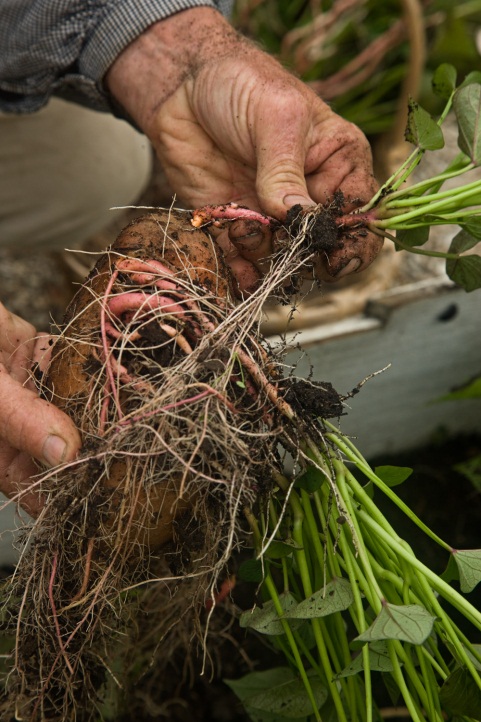The sweet potatoes slips have now been planted. We obtained the slips from mature tubers buried in the hotbed frame in mid-April.
The tubers were kept well watered and once the foliage appeared and the weather was decidedly warmer the potatoes were lifted from the frame and the slips carefully detached from the tuber. As with all transplants the process is best accomplished on an overcast day with rain in the forecast. The slips were then laid out on furrows, prepared in advance, about eighteen inches asunder and in rows three feet apart. The furrows will keep them from the wet and make them easier to find in the fall.
The ground you choose for your crop should be well composted but not overly rich for too much fertilizer will produce excessive vines at the expense of the potatoes. Once planted the slips are thoroughly watered and in a few weeks will make the most luxuriant growth.
The sweet potato, a native of South America, predates both the English and the white potato in North America and was generally known as the Spanish potato by 18th century authors. It was known as batata to the natives of the Caribbean Islands which gave rise to the English potato.
John Gerard created a great deal of confusion when he named the white, or Irish, potato “Potatoes of Virginia” in The Herball published in 1597. In fact, the white potato would not arrive in Virginia for another 150 years and this early misnaming of the plant perplexed botanists for the next century.
Robert Beverly addressed the confusion in The History and Present State of Virginia (1705) writing that the sweet potato “our Natives had originally amongst them” and “I take these Kinds to be the same with those, which are represented in the Herbals, to be Spanish Potatoes. I am sure, those call’d English or Irish Potatoes are nothing like these, either in Shape, Colour, or Taste.”


Laura Matey says
Hello - this is “Chloe’s Mom”. Chloe still talks about our last visit in early May and is looking forward to a late summer or fall visit! Our English peas are planted and starting to bloom here in NJ. The “soil scientist” brother-in-law plans to come with us in the fall for visit and I already told him we’ll need to find you at the garden.
Dearest Laura,
So nice to hear from you! English peas are one of the spring’s greatest rewards and I wish you success in a bountiful harvest and look forward to seeing you and your family later this year.
Yr. obedient Servant, I remain,
Wesley Greene